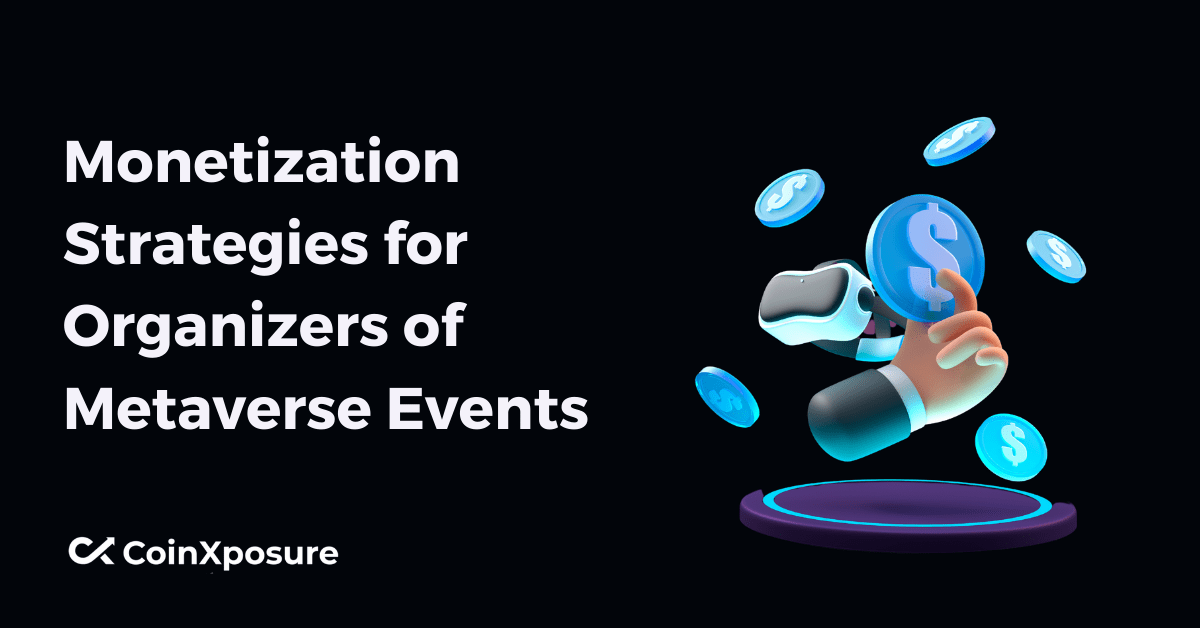
Monetization Strategies for Organizers of Metaverse Events
The metaverse concept has rapidly transformed from science fiction to an integral part of modern-day digital culture.
As virtual environments continue to gain prominence, so too do the opportunities for organizers to host immersive metaverse events. However, with the evolution of these virtual spaces comes the need for effective monetization strategies.
Organizers must navigate the complexities of generating revenue while maintaining engagement and providing value to participants.
This article explores various monetization avenues tailored to organizers of metaverse events, offering insights into maximizing profitability while fostering vibrant virtual communities.
Monetization Strategies for Organizers of Metaverse Events
Here are some monetization strategies for organizers of metaverse events:
- Ticket Sales
- Sponsorship and Brand Partnerships
- Virtual Merchandise Sales
- In-Event Transactions
- Subscription Models
Ticket Sales
To attract attendees, offer tiered pricing options, early bird discounts, and VIP packages with exclusive perks.
Sponsorship and Brand Partnerships
Integrate virtual brands within the metaverse, host sponsored activities/experiences, and provide space for brand advertising.
Virtual Merchandise Sales
Sell exclusive digital items such as avatars, clothing, accessories, limited edition collectibles, and customizable virtual goods.
In-Event Transactions
Implement virtual currency for purchases, offer virtual real estate rental/sales, and earn commissions from virtual transactions like art sales or real estate deals.
Subscription Models
Provide access to premium content/areas through subscriptions, offer membership tiers with benefits, and grant exclusive event access to subscribers.
Effective implementation and execution, along with constant monitoring and adjustment based on user feedback and market trends, are crucial for maximizing revenue and ensuring a seamless user experience in the metaverse.
Implementation and Execution
Choosing the Right Mix: Evaluate the target audience and event goals to determine the most suitable monetization strategies. Balance between ticket sales, sponsorships, merchandise, transactions, and subscriptions for optimal revenue generation.
Seamless User Experience: Design a user-friendly interface for transactions and purchases within the metaverse. Ensure smooth integration of payment systems and provide clear instructions for attendees to participate in monetized activities.
Leveraging Technology: Utilize advanced technology for efficient payment processing and secure transactions. Explore blockchain solutions for transparent and decentralized virtual economy management.
Monitoring and Adjustment: Regularly monitor user engagement, transactional data, and feedback to identify areas for improvement. Adjust monetization strategies based on user behavior, market trends, and emerging opportunities.
By implementing these steps, organizers can effectively execute their monetization strategies and maximize revenue while enhancing the overall experience for participants in metaverse events.
Challenges and Considerations
User Experience vs. Monetization: Striking a balance between monetization efforts and maintaining a positive user experience is crucial.
Avoid overwhelming attendees with excessive advertisements or intrusive monetization tactics that may detract from their event enjoyment.
Privacy and Security Concerns: Addressing data privacy and security concerns is paramount in the metaverse. Implement robust security measures to safeguard user information and ensure compliance with relevant regulations such as GDPR and CCPA.
Adapting to Evolving Technology: The rapid pace of technological advancement in the metaverse presents opportunities and challenges. Organizers must stay abreast of emerging technologies and trends to remain competitive and adapt their monetization strategies accordingly.
Community Backlash: Commercializing virtual spaces can sometimes lead to backlash from the community. Engaging with stakeholders and soliciting feedback to mitigate potential concerns and maintain trust among participants is essential.
Navigating these challenges requires careful consideration and proactive measures to ensure the successful implementation of monetization strategies while fostering a thriving and sustainable metaverse ecosystem.
Conclusion
Monetizing metaverse events offers organizers various opportunities to generate revenue and create immersive experiences for participants.
By implementing a strategic mix of ticket sales, sponsorships, merchandise, transactions, and subscription models, organizers can maximize profitability while providing value to attendees.
However, it’s essential to approach monetization cautiously, balancing revenue generation with user experience and privacy considerations.
By leveraging technology, monitoring user feedback, and adapting to evolving trends, organizers can overcome challenges and ensure the long-term success of their metaverse events.
The metaverse presents an exciting frontier for innovation and growth, with endless possibilities for monetization and community engagement.
By embracing creativity and staying attuned to the needs of their audience, organizers can continue to thrive in this dynamic digital landscape.





